Dead Or Alive 2: Birds (2000)
Directed by: Takashi Miike
Written by: Masa Nakamura
Starring: Edison Chen, Noriko Aota, Riki Takeuchi, Shô Aikawa
AKA DEDDO OA ARAIBU: TOBOSHA
Japan
AVAILABLE ON DUAL FORMAT BLU-RAY AND DVD: NOW, from ARROW VIDEO, in the DEAD OR ALIVE TRILOGY BOXSET
RUNNING TIME: 97 min
REVIEWED BY: Dr Lenera, Official HCF Critic
Yakuza assassin Mizuki Okamoto’s latest kill goes wrong when another assassin shoots his target instead, an assassin who also seems to have stolen his name. He tracks him down and discovers that the person is actually Shuichi Sawada, a childhood friend who grew up on the same island and in the same orphanage as he, but was moved away. Wanted by both the Yakuza and the Triads, they return to the island and meet another old friend Kohei. Contact with the present children of the orphanage makes them take the decision to go back to working as professional killers, but this time together, and the money they will get will be used to buy vaccines for the children in the Third World….
Tom Mes, who did the audio commentary for Dead Or Alive and some other Takashi Miike pictures released by Arrow Video, mentioned that Dead Or Alive 2: Birds, the middle film in Miike’s Dead Or Alive Trilogy – films which seem to be virtually unrelated except for starring the same two lead actors – was his favourite film from this director. I’m not sure that it quite matches Audition in my book, but I do agree that it’s of considerable quality. Much like Rainy Dog was a much more sedate and thoughtful piece than Shinjuku Triad Society the first instalment of his Black Society Trilogy, Dead Or Alive 2: Birds is much calmer and more reflective than its predecessor, and may disappoint those who expect more crazy, over the top violence and nastiness. There definitely is some of that in this film, but it’s mostly handled with restraint, though there are still plenty of bizarre touches and probably more overt stylisation, yet as with Audition Miike remains in total control of the story and its themes. And up to now, while I’ve very much enjoyed the Miike films I’ve seen, I’ve sensed a certain coldness to them which meant that, aside from certain sequences, I wasn’t as emotionally invested in what I was watching as perhaps I would have liked. That certainly wasn’t the case with this movie, its tragic tale of waste, the beauty of childhood and the terrible effect of violence having a quietly powerful effect which even Miike’s oddest touches [like Mizuki and Shuichi suddenly sprouting angel wings as they embark on their ‘killing for a good cause’ spree] never override.
A young boy looks at the screen and the words: “Where are you”? come up on a black screen, something that is repeated several times throughout the film, each adding some poignancy to what’s just happened, and especially so at the end. Now I reckon that many fans of the first movie felt let down by the fact that Miike doesn’t begin with a crazy, fast-cut montage full of violence, but I loved what he did instead. A gangster uses Chinese and Japanese packets of cigarettes to dramatise the struggle between Chinese and Japanese gangs, getting more and more animated as he crushes cigarettes representing gangsters being mowed down. It’s funny, original and pure Miike, one of the kinds of things this director is all about. The guy is also a magician, pulling various flags out from the back of his head, though Mizuki isn’t impressed as he prepares for his next kill, a kill which goes awry when somebody else does the job for him. Dreadful-looking CGI birds [well, I think they’re supposed to be birds, it’s hard to tell] fly around, and I have to say that Miike’s use of distinctly poor computer graphics here and there in his films is a little odd, though some might say it’s deliberately poor to add a cartoonish effect at times. Anyway, the two soon meet up, Mizuki literally sliding into view, and realise they were once the best of friends. In fact there seems to be a slight touch of homosexuality throughout, something probably intentional as Miike portrays it in other films, though he’s unusually subtle here so the viewer can take away from the relationship whatever he or she wants.
The two return to their childhood island and there’s more than a feel of Sonatine [but then Takeshi Kimura’s work often seems to be an influence on Miike’s] as they start to play like children again in some scenes which manage to totally not seem absurd. We also get a series of flashbacks to their childhood [a common Miike device but not generally to the same extent as here],where they lived in an orphanage ran by a Japanese Christian priest, a character who seems to flit back and forth from being dislikeable to likeable which was clearly the intention: characters in Miike’s films tend to be grey rather than black or white. The flashbacks certainly have a warm sense of nostalgia about them but this is partly undercut by the sadness of the way Mizuki and Shuichi eventually turned out. And when the two decide to kill ‘for good’, there’s an uncomfortable irony throughout, and certainly no glorification of violence. In fact this film really does seem to tell us that there shouldn’t really be any killing whatsoever and hammers home this point several times with unsubtle but powerful visual metaphors. This may be the main reason why Miike holds back on the shocking stuff. A couple are shot dead while having sex and the woman raped, but it’s shown very briefly. One kill just ends up with the camera lens spattered with the red stuff. Another shows us a diagram of the victim’s head and what the bullet’s doing. It’s mostly just lots of bloody bullet wounds, and that’s fine, because the film and its script by Masu Nakamura is generally so rich and intelligent.
Takashii still likes to challenge the viewer, and no less than during a superbly put together montage where shots of a fight between Japanese and Chinese gangs which spills out onto the streets, are intercut with a children’s play in which Mizuki and Shuichi are performing, a children’s play where they are dressed as a lion and a kappa [mythical human/tortoise hybrid] respectively but feel the need to add certain ‘adult’ elements. It’s very funny [and the audience love it] but what’s really clever about it is how you keep on laughing through the gangster violence that’s intercut with it because the clips are so short, yet feel very uncomfortable afterwards. Another violent montage is intercut with real shots of starving children. Miike’s odd fixation with penises does rear its head several times, notably when a woman strokes the blurred out phallus of her husband and it’s absolutely huge [and of course blurred out]. But generally his strange sense of humour does result in either genuine chuckles or a “WTF” [in a good way], like three pudding-loving assassins who communicate entirely by mobile phone [much like an increasingly number of people today then]. There are a few moments where he jumps through parts of the story which are rather dizzying, and perhaps having the two adult main characters actually become their younger selves is possibly taking the symbolism too far, but overall the sad fatalism of the piece is constantly present, the thing becoming virtually like a Greek tragedy.
There’s much attention paid to the look of the film – many of the scenes in the first half are dominated by green – and it’s nice to see Show Aikawa and Riki Takeuchi virtually reverse their roles in Dead Or Alive, Aikawa now taking the part of the more flamboyant character with his dyed yellow hair, matching shirt, and frequent chatter, while Takeuchi is the quieter of the two and goes around in slick suits, more like the conventional kind of killer in Asian cinema. The two, who only shared a few scenes in Dead Or Alive, have great chemistry together. And actually there are a couple of moments that seem to reference the earlier film, Mizuki pulling out a brick from his back and later sporting a cyborg arm while he’s performing in the play. Often funny, and sometimes more than a little crazy, Dead Or Alive 2: Birds is nonetheless dominated by its feeling of sadness, a sense of regret, a sense of wasted lives, a longing for that time when our future was ahead of us and everything seemed possible. Miike really turned out a fine piece of work here, and a piece of work that is unmistakably Miike yet something very fresh and in some ways very relatable too.
Rating: 









This sequel looks just as good as its predeccessor on Blu-ray though sadly lacks an audio commentary, a shame as Mes said this was his favourite Miike. Still, the interview with Aikawa is definitely worth a watch. Unlike Takeuchi, Aikawa doesnt’t go much into his overall career [though he does describe a Zatoichi play where it was thought that killng 70 people on stage wasn’t enough for him] and focuses on the Dead Or Alive films. As before, the interview is best watched after one has seen all three films owing to the amount of clips and discussion about it. He goes into some detail about Miike’s methods, such as pushing him to do his own stunts. Unsurprisingly, neither star knew what they were about to film when they went to shoot Dead Or Alive‘s ending, and Aikawa pulling off his arm was an ad-lib and left in. The Japanese making of featurette is quite short and contains many clips from the film, but does show some of the key scenes being filmed. One thing seems certain: Miike film sets are probably a lot of fun and probably very chaotic.
SPECIAL FEATURES:
DEAD OR ALIVE 2: BIRDS
*Show Arikawa: Cop, Killer, Cyborg
*Archive making of
*Japanese trailer
DEAD OR ALIVE TRILOGY BOXSET
*High Definition digital transfers
*Optional stereo audio
*Original theatrical trailers
*Reversible sleeve featuring original and newly commissioned artwork by Orlando Arocena
*FIRST PRESSING ONLY: Illustrated collector’s booklet featuring new writing on the films by Kat Ellinger

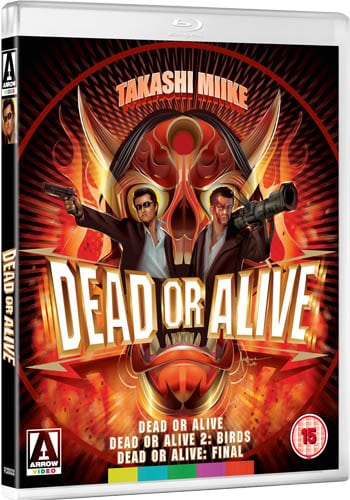
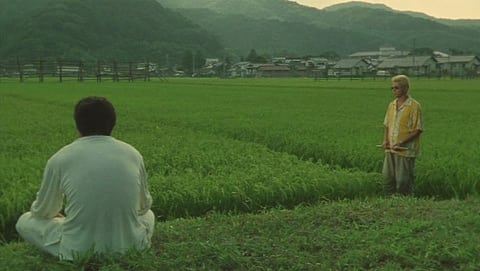
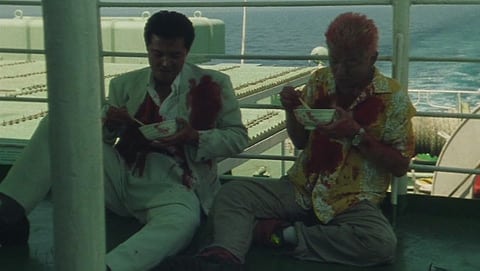

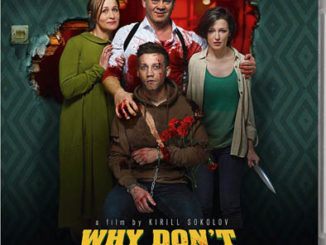
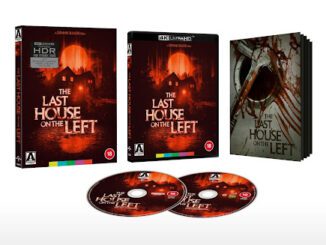
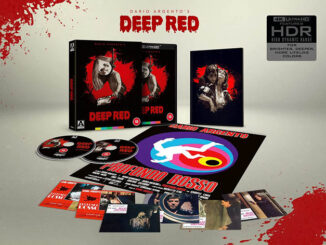
Be the first to comment